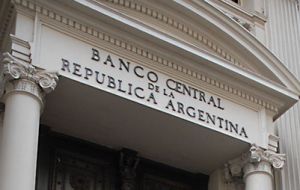MercoPress. South Atlantic News Agency
Argentina imposes strict rules on foreign-exchange trading
 The central bank has reserves estimated in 49 billion USD
The central bank has reserves estimated in 49 billion USD Argentina tightened foreign-exchange rules Monday in a step it says is aimed at limiting money laundering and tax evasion, but which most observers say it is geared to restrict the flow of dollars.
The government will require people or companies who buy more than 250,000 USD of foreign currencies per year to provide proof of their income, the Central Bank said in a press release Monday.
In addition, any monthly purchases of foreign currencies over 20,000 USD will have to be conducted by check or wire transfer, rather than cash.
The limit of purchases of up to 2 million USD per calendar month without a specific destination was maintained. The current rules controlling foreign exchange purchases to pay for things such as imports, dividends and overseas debt payments will also be unchanged.
Argentina's government has sought in recent months to combat criticism that it hasn't done enough to tackle money laundering. However investors are worried that the government, through the new rules, could have an ulterior motive of preventing dollars from leaving the country.
The government has been keen to use the surplus of dollars flowing into Argentina as a buffer to protect the local economy from international financial turmoil, and has built up reserves of some 49 billion USD at the central bank.
The main purpose of the foreign-exchange reserves is to allow the central bank to manage the currency. It intervenes heavily in the local exchange market and deployed a large amount of the foreign-exchange reserves during the acute stage of the financial crisis in late 2008 and early 2009 to prevent the Argentine peso from depreciating significantly.
It has also started to use those reserves as part of its broader response to the recent global economic downturn. This year it assigned some 6.6 billion USD to pay down debts due in 2010, which caused a crisis in Congress, where opposition politicians claimed the government hadn't secured proper authorization.
However financial-market experts said the new effort probably won't have much effect. La Nacion quoted Arturo Piano, a director of Argentina's Banco Piano, who said that “if you restrict the purchase of dollars, people will want them even more and that will make the price rise”.




Top Comments
Disclaimer & comment rules-

Read all commentsCFK taking lessons from Hugo? It is interesting to watch what has happened in Venezuela then later echoed in Argentina.
Jun 08th, 2010 - 10:56 am 0Commenting for this story is now closed.
If you have a Facebook account, become a fan and comment on our Facebook Page!